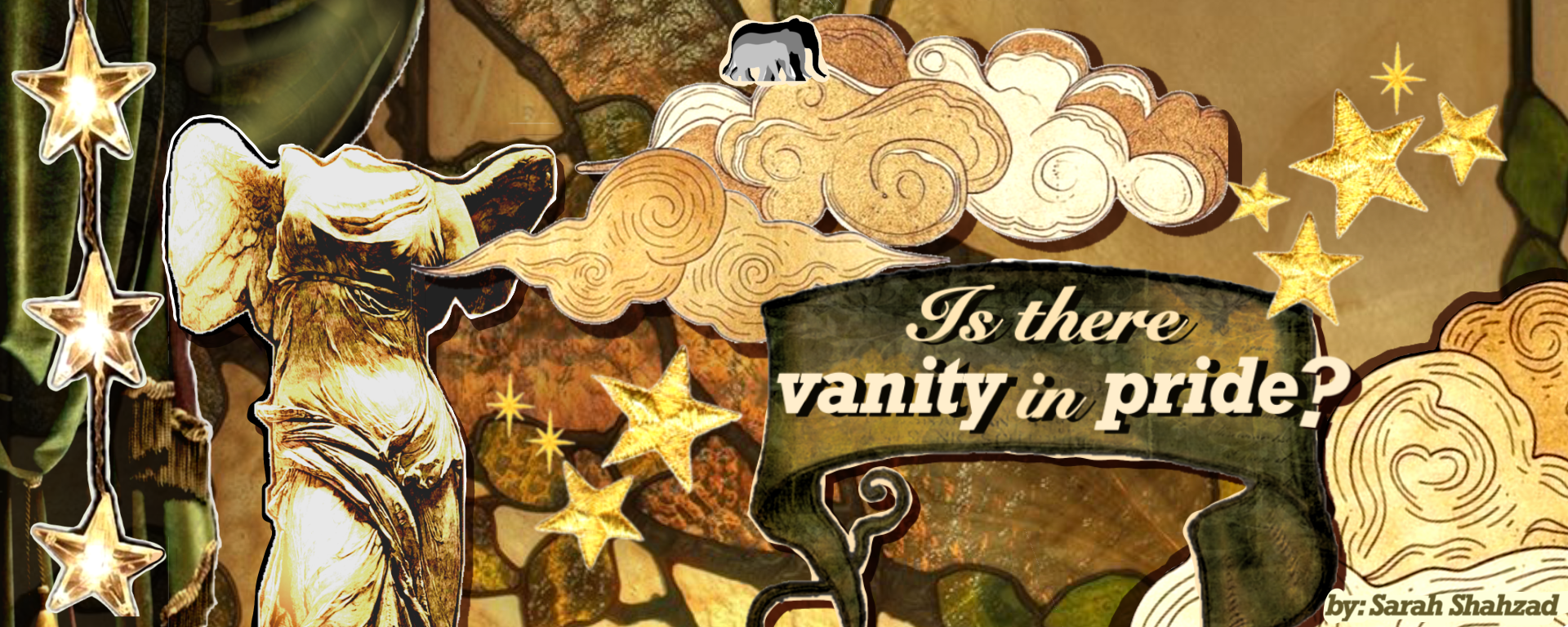The feeling of deep satisfaction and a boost in self-worth that one feels after accomplishments is best described as the feeling of pride. A way for a man to respect himself, his honour, and his dignity. Taking too much solace in this feeling, however, fuels arrogance and entitlement, transitioning it into vanity. The more wood you feed the fire, the greater the flame becomes until it dissolves everything around it—that is when you do not appreciate the warmth that the fire once provided, or the light that it gave. But now, you run away from how harmful—how rampant the once humble fire has become.
Similarly, pride could be considered as a sort of admiration for oneself, or a way for someone to be happy in their own skin, but if this degenerates to a feeling of self-obsession or narcissism where one’s achievements are just shallow and superficial, that is when pride turns to vanity. It is when your achievements are not just for you to feel satisfied, but now your success is either to flaunt or to spite. It is not enough if you feel beautiful, but it is when you must be the most beautiful. People who harbor this feeling are never truly satisfied with their wins until someone else feels a sense of loss.
How does one, then, know where pride finishes and vanity starts, or if they have crossed the line from humility to conceit? The story of Niobe explains the clashes of pride and how it was not enough for her to be beautiful or be grateful for her children, but instead a means for her to parade her superiority. Niobe, born to a household of wealth, was not only graced with beauty but was blessed with having many children. It was when her good fortune started to fan her pride that she began to mock Leto, the mother of twin gods Apollo and Artemis. Niobe flaunted that she was not only a greater woman because of her good looks, but also a more accomplished one because of the number of children she had. Consumed by her vanity, she instructed the people of Thebes to divert their worship from Leto to her. Enraged, Apollo and Artemis punished Niobe by shooting most of her children down with arrows as she fled to Mount Sipylus, only to be turned to stone; doomed to eternal mourning.
Aside from Niobe’s all-consuming pride, we also see a type of pride that Apollo and Artemis harbored, who could not bear any more harm to themselves or their mother’s dignity, and thus, decided to punish Niobe. Their pride was rooted in their mother’s self-worth and respect. The attack on their mother’s honor and dignity was when their own pride was harmed. Both parties were seen to guard their honor amongst all else, but in this story, it’s understandable why we, as humans, view vanity as a punishable act. While an act of showing pride in the form of respecting one’s worth is seen as a heroic act.
It is in human nature to achieve just for the sake of comparison or to set oneself apart. Even when a person is vain, his achievements are still undeniable and will always remain, but these victories then get tainted under the light of narcissism and conceit. Losing a war is a sign of defeat, but a soldier can come home proudly saying that he served his nation. The king who flaunts his victory in an ostentatious way is known as a tyrant. It’s ironic how pride earns honor in loss, but breeds vanity in victory.
Existentialist Jean Paul Sartre’s concept of bad faith links closely to the hollowness of a soul that is vain. Bad faith (mauvaise foi) is based on the idea of radical freedom; we exist first and then we become. We are who we are through our choices and decisions, according to Sartre.
In one sense, choice is possible, but what is not possible is not to choose. I can always choose, but I must know that if I do not choose, that is still a choice.
Since people are conscious of their choices, they choose to deceive themselves by living according to external definitions, away from their authentic self. The concept of vanity fits under bad faith, where instead of embracing one’s true self, their worth depends on how others perceive them. They deny the truth and become what the people around them value, playing themselves into self-deception.
Vanity has two main characteristics. Firstly, a person who is vain is a narcissist—someone obsessed with the idea of themselves. On the other hand, we know that vanity is truly achieved when a man accomplishes what the people around him want. Vanity only exists if what you have is of value to the people around you. But then why does he, who thinks he is worthy of applause amongst others, wait to be applauded by those he feels are unworthy? Why does he then long for the sound of claps from people who fall below him?
In reality, people who are vain are just as valuable as the people around them perceive them as. Since they do not hold an internal integrity and are shallow, their status is only achieved by those who have put them up, not by oneself. It is easy to say that they are simply hollow beings, just as great as you make them out to be.
He, who is vain, begs for applause to feel complete. Whilst he who is proud assumes it. The irony of it remains that both cannot perform without the presence of an audience. An audience who they feel are unworthy of the same pedestal, but are valuable enough to put them on it. It is the hands of those unworthy applauders who have built the pedestal of the worthy.
– Sarah Shehzad

